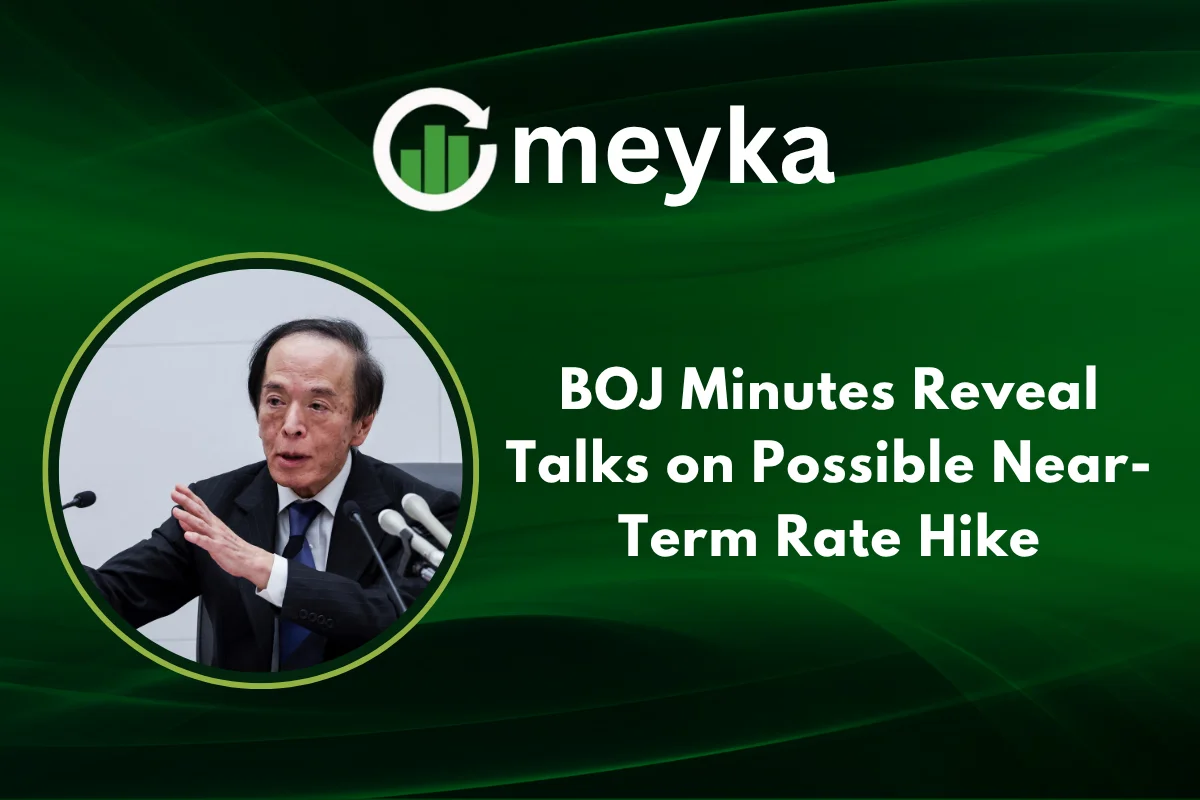BOJ Minutes Reveal Talks on Possible Near-Term Rate Hike
The latest Bank of Japan (BOJ) meeting minutes have attracted global attention as policymakers discussed the possibility of a near-term rate hike. For years, Japan has maintained an ultra-loose monetary policy, keeping interest rates at historically low levels. However, shifting economic conditions, rising inflation, and global monetary tightening are forcing Japan to consider a policy shift.
This development could mark a turning point for Japan’s economy and influence the stock market, especially as investors evaluate its impact on both domestic and global assets.
BOJ Shifts Tone Amid Global Monetary Tightening
For decades, the BOJ has stood out among major central banks for its negative interest rate policy and aggressive bond-buying program. While the Federal Reserve and the European Central Bank raised rates to combat inflation, Japan held firm on accommodative measures to stimulate growth.
Now, BOJ minutes reveal that several members are concerned about sustained inflationary pressure. Consumer prices have consistently remained above the 2% target, driven by higher energy costs, a weaker yen, and rising wages. The discussion of a rate hike indicates the central bank is preparing to align more closely with global monetary trends.
If the BOJ raises rates sooner than expected, this would signal a major policy shift with far-reaching implications.
Impact on Japan’s Stock Market and Investors
The potential change in monetary policy has immediate consequences for the stock market. Low interest rates have supported Japanese equities by reducing borrowing costs for corporations and encouraging investors to seek higher returns in stocks.
A rate hike, however, could alter this dynamic:
- Higher borrowing costs may challenge highly leveraged companies.
- Financial stocks, particularly banks and insurers, could benefit from improved profit margins.
- Exporters may face headwinds if the yen strengthens, reducing overseas earnings.
Investors engaged in stock research are closely monitoring sectors most sensitive to interest rates, such as real estate and consumer discretionary. Meanwhile, growth sectors like AI stocks may remain attractive as innovation continues to drive long-term value.
Global Implications of a BOJ Rate Hike
A policy shift in Japan would not only impact domestic markets but also ripple across the global financial system. Japan is the world’s third-largest economy and a major participant in global bond markets.
- Currency Market Impact: A rate hike would likely strengthen the yen, reversing years of depreciation. This could shift capital flows and affect trade balances.
- Bond Yields: Higher Japanese government bond yields could attract global investors, creating competition for U.S. Treasuries and European bonds.
- Emerging Markets: Countries relying on Japanese investments might experience capital outflows if funds return to Japan.
Such outcomes highlight why BOJ minutes are closely scrutinized by international investors and institutions.
Inflation and Wage Growth in Japan
One of the key drivers of the BOJ’s debate is inflation. Unlike previous cycles, Japan’s current inflation is supported by wage growth, a critical factor for sustainable price stability.
Major corporations have agreed to significant wage increases during annual labor negotiations. This trend suggests that Japan may finally escape the cycle of deflationary pressures that dominated for decades.
Sustained wage growth strengthens the BOJ’s argument for normalization, making a near-term rate hike more likely than in previous years.
Comparison with Other Central Banks
The BOJ’s cautious stance contrasts with aggressive policies by the Federal Reserve and the European Central Bank. However, with inflation persisting above target, Japan risks falling behind if it fails to act.
While the Fed is signaling rate cuts in 2025 after aggressive tightening in earlier years, the BOJ is only beginning to discuss hikes. This divergence underscores Japan’s unique economic situation but also signals potential convergence in global monetary policy.
Investor Strategies in a Shifting Environment
For investors, the possibility of a BOJ rate hike requires careful adjustments. Stock research suggests the following strategies:
- Focus on financials: Banks, brokers, and insurers stand to benefit the most.
- Hedge against currency risk: A stronger yen could hurt exporters, so investors should diversify into companies less reliant on overseas earnings.
- Seek innovation-driven growth: AI stocks, semiconductor companies, and robotics firms may continue to thrive regardless of rate changes.
Global portfolio managers must also evaluate exposure to Japanese bonds, which could offer higher yields in the future.
Long-Term Outlook for the Japanese Economy
A rate hike by the BOJ would not be an isolated event; it could mark the beginning of a gradual normalization process. The shift would signal confidence in Japan’s ability to sustain growth without relying on ultra-loose policy.
Key factors to watch in the coming months include:
- The trajectory of inflation and wage growth
- Yen performance against the U.S. dollar and euro
- Corporate earnings amid changing borrowing conditions
- International investor sentiment toward Japanese bonds
If managed carefully, normalization could strengthen Japan’s financial stability while boosting investor confidence in the long term.
Conclusion
The BOJ minutes make it clear that policymakers are weighing a significant change in direction. After years of negative rates and unprecedented monetary easing, a near-term rate hike appears increasingly possible.
This shift would influence not only Japan’s domestic economy but also the broader global financial system. From the stock market to currency movements and bond yields, the implications are profound.
Investors should remain alert, conduct thorough stock research, and consider both risks and opportunities across various sectors. With innovation-driven industries like AI stocks continuing to expand, Japan’s evolving policy landscape may open new avenues for growth.
FAQs
The BOJ is responding to sustained inflation above its 2% target, supported by rising wages and stronger domestic demand. These conditions suggest the economy may no longer require negative interest rates.
A rate hike would likely strengthen the yen, making Japanese exports less competitive but increasing the purchasing power of domestic consumers.
Financial institutions such as banks and insurers generally benefit because they can improve lending margins. Conversely, heavily leveraged companies may face challenges.
Disclaimer:
This content is made for learning only. It is not meant to give financial advice. Always check the facts yourself. Financial decisions need detailed research.






